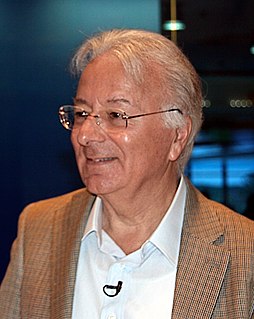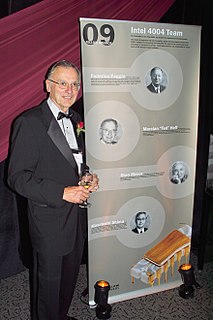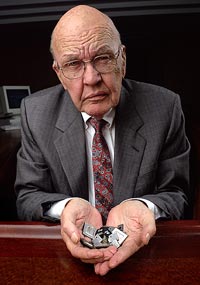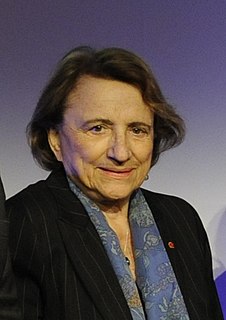 W
WSydney Brenner was a South African biologist. In 2002, he shared the Nobel Prize in Physiology or Medicine with H. Robert Horvitz and Sir John E. Sulston. Brenner made significant contributions to work on the genetic code, and other areas of molecular biology while working in the Medical Research Council (MRC) Laboratory of Molecular Biology in Cambridge, England. He established the roundworm Caenorhabditis elegans as a model organism for the investigation of developmental biology, and founded the Molecular Sciences Institute in Berkeley, California, United States.
 W
WFederico Faggin is an Italian-American physicist, engineer, inventor and entrepreneur. He is best known for designing the first commercial microprocessor, the Intel 4004. He led the 4004 (MCS-4) project and the design group during the first five years of Intel's microprocessor effort. Faggin also created, while working at Fairchild Semiconductor in 1968, the self-aligned MOS (metal–oxide–semiconductor) silicon-gate technology (SGT), which made possible MOS semiconductor memory chips, CCD image sensors, and the microprocessor. After the 4004, he led development of the Intel 8008 and 8080, using his SGT methodology for random logic chip design, which was essential to the creation of early Intel microprocessors. He was co-founder and CEO of Zilog, the first company solely dedicated to microprocessors, and led the development of the Zilog Z80 and Z8 processors. He was later the co-founder and CEO of Cygnet Technologies, and then Synaptics.
 W
WSir Charles Antony Richard Hoare is a British computer scientist who has made foundational contributions to programming languages, algorithms, operating systems, formal verification, and concurrent computing. His work earned him the Turing Award, usually regarded as the highest distinction in computer science, in 1980.
 W
WMarcian Edward "Ted" Hoff Jr. is one of the inventors of the microprocessor.
 W
WRudolf Emil Kálmán was a Hungarian-American electrical engineer, mathematician, and inventor. He is most noted for his co-invention and development of the Kalman filter, a mathematical algorithm that is widely used in signal processing, control systems, and guidance, navigation and control. For this work, U.S. President Barack Obama awarded Kálmán the National Medal of Science on October 7, 2009.
 W
WRichard Manning Karp is an American computer scientist and computational theorist at the University of California, Berkeley. He is most notable for his research in the theory of algorithms, for which he received a Turing Award in 1985, The Benjamin Franklin Medal in Computer and Cognitive Science in 2004, and the Kyoto Prize in 2008.
 W
WJack St. Clair Kilby was an American electrical engineer who took part in the realization of the first integrated circuit while working at Texas Instruments (TI) in 1958. He was awarded the Nobel Prize in Physics on December 10, 2000. Kilby was also the co-inventor of the handheld calculator and the thermal printer, for which he had the patents. He also had patents for seven other inventions.
 W
WWilliam David Kingery was an American material scientist who developed systematic methods for the study of ceramics. For his work, he was awarded the Kyoto Prize in 1999.
 W
WDonald Ervin Knuth is an American computer scientist, mathematician, and professor emeritus at Stanford University. He is the 1974 recipient of the ACM Turing Award, informally considered the Nobel Prize of computer science. Knuth has been called the "father of the analysis of algorithms".
 W
WThe Kyoto Prize in Advanced Technology is awarded once a year by the Inamori Foundation. The Prize is one of three Kyoto Prize categories; the others are the Kyoto Prize in Basic Sciences and the Kyoto Prize in Arts and Philosophy. The first Kyoto Prize in Advanced Technology was awarded to Rudolf E. Kálmán, the "creator of modern control and system theory". The Prize is widely regarded as the most prestigious award available in fields which are traditionally not honored with a Nobel Prize.
 W
WPaul Christian Lauterbur was an American chemist who shared the Nobel Prize in Physiology or Medicine in 2003 with Peter Mansfield for his work which made the development of magnetic resonance imaging (MRI) possible.
 W
WNicole Marthe Le Douarin is a developmental biologist known for her studies of chimeras, which have led to critical insights regarding higher animal nervous and immune systems.
 W
WJohn McCarthy was an American computer scientist and cognitive scientist. McCarthy was one of the founders of the discipline of artificial intelligence. He co-authored the document that coined the term "artificial intelligence" (AI), developed the Lisp programming language family, significantly influenced the design of the ALGOL programming language, popularized time-sharing, and invented garbage collection.
 W
WMasatoshi Shima is a Japanese electronics engineer. He was one of the architects of the world's first microprocessor, the Intel 4004. In 1968, Shima worked for Busicom in Japan, and did the logic design for a specialized CPU to be translated into three-chip custom chips. In 1969, he worked with Intel's Ted Hoff and Stanley Mazor to reduce the three-chip Busicom proposal into a one-chip architecture. In 1970, that architecture was transformed into a silicon chip, the Intel 4004, by Federico Faggin, with Shima's assistance in logic design.
 W
WSir Maurice Vincent Wilkes was a British computer scientist who designed and helped build the Electronic Delay Storage Automatic Calculator (EDSAC), one of the earliest stored program computers, and who invented microprogramming, a method for using stored-program logic to operate the control unit of a central processing unit's circuits. At the time of his death, Wilkes was an Emeritus Professor at the University of Cambridge.
 W
WKurt Wüthrich is a Swiss chemist/biophysicist and Nobel Chemistry laureate, known for developing nuclear magnetic resonance (NMR) methods for studying biological macromolecules.